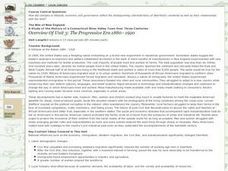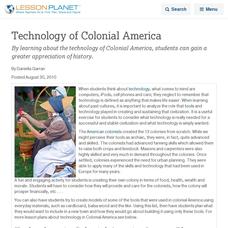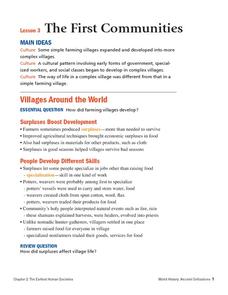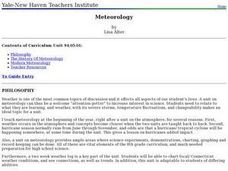Curated OER
Making a Brand for Ourselves the "Cowboy" Way
Fourth graders research the history of Utah. Students explore westward expansion and the importance of ranching in Utah's history. Students also investigate cattle drives in Utah.
Curated OER
Houghton Mifflin Social Studies/Chapter 11, Lesson 2: New Uses of Science and Technology (pp. 255-259)
Fourth graders reflect upon the development of technology and how it has effected the lives of Californians. Drawings and writings are used as media for self-expression. The areas of focus are aviation, sea exploration, and farming.
Curated OER
Hopi Agriculture
Young scholars discuss the farming practices of the past and present of the Hopi people and discuss the importance of corn. For this Hopi agriculture lesson plan, students also plant their own seeds of corn.
Curated OER
Agriculture in Motion
Students discuss agriculture. In this farming lesson, students compare farming practices from the past compared to when machines were introduced. They discuss this concept as a class and participate in multiple activities. This lesson...
Curated OER
Mississippi
For this Mississippi worksheet, students read a two page text about the history of the state of Mississippi. Students then answer 10 true and false questions.
Curated OER
Chapter 17 – The Great Depression
In this U.S. history activity, high schoolers read assigned textbook pages on the Great Depression and respond to 27 short answer questions.
Curated OER
Settlement Search
In this North Dakota Heritage Center learning exercise, students explore the settlement of North Dakota through its statehood as they read several brief selections and respond to 24 question as they look at exhibits.
Curated OER
How did rice first come to America?
Students discover how rice first came to America. In this rice history lesson, students discuss how a boat captain gave people a bag of rice seeds for fixing his ship. They draw a picture of a ship and create pictures that show how the...
Curated OER
Rise of Industry
In this United States history worksheet, students utilize a word bank of 10 terms or phrases to answer 10 fill in the blank questions pertaining to the Industrial Revolution. A short answer question is included as well.
Curated OER
The American Civil War
In this American history worksheet, students learn about the American Civil War. They first read a 2 page explanation of the war and events that took place. Students then answer 9 questions pertaining to the information they just read....
Curated OER
Massachusetts
In this Massachusetts activity, students read a two page text about the history of the state of Massachusetts. Students answer 10 true and false questions.
Curated OER
Missouri
In this Missouri instructional activity, students read a detailed 2 page history of the state. Students answer ten true and false questions about the passage.
Curated OER
You Gotta Know the Territory
Students examine the relationship between Native Americans and those who settled the Iowa territory. For this Iowa history lesson, students investigate the process for settling the territory and how intercultural relationships developed...
Curated OER
Freedmen & Jim Crow
In this United States history worksheet, students utilize a word bank of 10 terms or phrases to answer 10 fill in the blank questions about the African American experience following the Civil War. A short answer question is included as...
Curated OER
From Foraging to Farming
Sixth graders understand the basic needs of humans. For this basic needs lesson, 6th graders participate in an activity to search for their basic needs. Students recognize the problems when their is scarcity of a necessity to their...
Curated OER
U.S. History: The Progressive Era
Students examine the Colonial Revival Movement as a response to industrialization and immigration. focusing on Deerfield, Connecticut, they create a documentary artifact reflecting the period.
Curated OER
Plant Science Chapter #1
It may not stand as a cohesive presentation, but individually you may find a use for these slides. One slide describes how civilization began once man learned to plant and harvest food. Another explores the population growth over time....
Curated OER
Oral History: Interviewing Elders
Sixth graders examine oral history traditions. They interview family members about their childhoods and compare them to their own. Students use the collected information to make posters, letters, essays, or poems about their research.
Curated OER
Technology of Colonial America
By learning about the technology of Colonial America, students can gain a greater appreciation of history.
Agriculture in the Classroom
Growing a Nation (1950-1969): Prosperity & Challenges: The Story of American Agriculture
A wonderful lesson on the development and impact of mechanized farming! History or agriculture classes learn the historical background of the United States' food production by creating a pamphlet with information on the cause and...
Houghton Mifflin Harcourt
The First Communities
These documents list essential questions and foundational concepts associated with early civilizations and farming communities in the agricultural revolution. Use this as a starting point for developing specific lessons and activities...
Curated OER
Who Are America's Harvesters?
Students explore the changes in American farming practices. Through several days of reading and research, students write an essay explaining the changes that have led to the need for migrant workers. Students discuss how workers are...
Curated OER
Meteorology
Middle schoolers research and produce an oral history that reflects the importance of meterologists in the lives of people in their community.
Curated OER
The Emancipation Proclamation
Middle schoolers read one of the most important documents in our nation's history: The Emancipation Proclamation of 1863. After everyone reads the proclamation, they set out to write a "You Were There" type of report on it. They pretend...
Other popular searches
- Farming History
- Ancient Farming
- Michigan Farming History
- Ancient Egyptian Farming
- Ancient Farming Agriculture

























